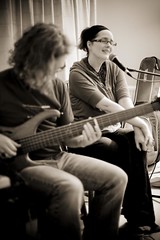 We’re just back from a fabulous run of house concerts in England and Scotland. All kinds of good times were had, friends were made, internet chums suddenly existed in meat-space too, and a lot of very fine music happened. Big, big thanks to the truly awesome people who hosted the gigs in Leeds, Camberley and Edinburgh. Expert humans, one and all. Continue reading “New House Concert Video”
We’re just back from a fabulous run of house concerts in England and Scotland. All kinds of good times were had, friends were made, internet chums suddenly existed in meat-space too, and a lot of very fine music happened. Big, big thanks to the truly awesome people who hosted the gigs in Leeds, Camberley and Edinburgh. Expert humans, one and all. Continue reading “New House Concert Video”
Third Preview Track From forthcoming Steve Lawson/Mike Outram album
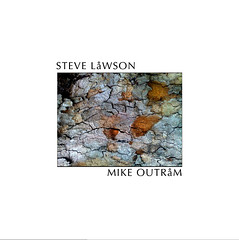 So, Mike Outram and I have been releasing a new preview track each time the play-count on the previous one reaches 500 – the last two are on Souncloud, and are both past that benchmark, so we’ve made another available.
So, Mike Outram and I have been releasing a new preview track each time the play-count on the previous one reaches 500 – the last two are on Souncloud, and are both past that benchmark, so we’ve made another available.
BUT.
It’s not on Soundcloud. It’s available for free in exchange for a Tweet.
Head to http://stevelawson.net/tft/ to get it. Continue reading “Third Preview Track From forthcoming Steve Lawson/Mike Outram album”
New Toys, New Music
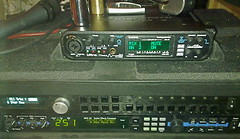 I finally got round to doing something I’ve been meaning to for ages, but never managed to line up being motivated and having the money for it – I replaced my live mixer and preamp with a MOTU Ultralite Mk III Soundcard.
I finally got round to doing something I’ve been meaning to for ages, but never managed to line up being motivated and having the money for it – I replaced my live mixer and preamp with a MOTU Ultralite Mk III Soundcard.
There are a number of reasons for this – Continue reading “New Toys, New Music”
How DO Musicians Earn Online?
 Social web has been buzzing these last couple of days with a visualisation by Information Is Beautiful, entitled “How Much Do Musicians Earn Online?†Click here to see it.
Social web has been buzzing these last couple of days with a visualisation by Information Is Beautiful, entitled “How Much Do Musicians Earn Online?†Click here to see it.
In case you’re not able to see the list, it’s a visual representation of how many instances of a range of online ‘music payment events’ you’d require to make a living wage solely from that service.
Not surprisingly, streaming services come out of it badly, especially when compared to sales of CDs.
However, the problem with presenting data in this way is that implicit within the list itself is the assumption of linearity: the list itself says “these are distinct events between which there is at least conceptual parity when comparing how many instances of that payment event are required to meet a particular sum.†Continue reading “How DO Musicians Earn Online?”
Spotify Is Broken: The Lie Of ‘Feels Like Free’
 One of the big questions hanging over Spotify for me has been ‘do premium plays pay more than Spotify Lite plays?’ – I.E., do I get paid more if someone with a premium account plays my tunes vs. someone using the ad-funded version.
One of the big questions hanging over Spotify for me has been ‘do premium plays pay more than Spotify Lite plays?’ – I.E., do I get paid more if someone with a premium account plays my tunes vs. someone using the ad-funded version.
It stands to reason that the person with the premium account is paying more to listen, so surely you’d imagine that’d be reflected in the royalties?
At SXSW this year, the CEO of Spotify was giving a talk, I asked the question about royalty rates via Hugh Garry and apparently they are distributed evenly.
This is, as far as I can see, Spotify’s MASSIVE mistake. A deal-breaking, game-not-changing, screw-up of gargantuan proportions.
Here’s why.
The people best placed to promote Spotify are artists. We can link to it from our sites, we can provide links to it when we release new music, we can blog about how great it is and share music by our peers via the links.
If we push it, it becomes the place to find our music.
Spotify needs premium accounts for it to work. At the moment, their strategy for getting people signed up is to annoy the shit out of you with adverts until you capitulate. So you get irrelevant adverts that provide no value at all to the user, and therefor no value to the advertiser. Ergo, the amount paid per advert is likely to go down not up, killing the ad funded model. If I was an advertiser there’s no way I’d bother with Spotify. ‘Can you pay to produce an advert that we’re going to use to annoy people into paying not to hear it?’ no thanks.
So what would work? Spotify’s (and the other streaming services) best chance of success is if artists see it as a viable alternative to selling individual albums and tracks digitally. If it becomes that, the amount of traffic will go up and all that listening will be happening in a discovery environment, so more music will be heard by more people.
They could also make way more if the ads were something other than anti-value annoyances to be got rid of. There are loads of ways of making ads work in this setting – referrals, targeting, favouriting, user-profiles, profit-share, in-browser special offers… all kinds of stuff that would make the ad-side of the site self-supporting. If it isn’t currently viable, then the solution is to up the level of the ads even further til it is viable. The listener needs to FEEL what their listening is actually costing.
Why? Well, contrary to what Gerd Leonard has been telling us for years, ‘Feels Like Free’ is not the answer. It never has been and never will be. Free is, in fact, better than ‘feels like free’. I’d rather make my music free to download, no strings, and be rewarded in gratitude than have some weird filtered, taxation-based payment mechanism for it where people are left thinking music has neither cost nor value because there’s no tiered pricing, no opportunity to ‘pay what you like’, no thought about the value over and above the experience that access is via a portal and detached from the artist…
Listening to ads is a form of payment. We all know that. If the ads don’t cover it, then it’s a lie to keep that system going by subsidising those listens from people who are actually paying – people who are quite explicitly paying a subscription rate that puts a distinct value on their listening time. To not divide those up is to say that the value of both listens is the same. It isn’t.
- Spotify Lite is a limited but hugely useful discovery platform. If you have the kind of life where Spotify Lite is ‘enough’, then you weren’t about to pay £10 an album for CDs anyway. You’re probably the kind of person who listens to the radio and buys the occasional compilation. Certainly not the kind of person for whom £120 a year for Spotify premium is workable.
- Spotify Premium is an alternative to buying music. It’s also, when you look at how long people spend listening to music, a great model for paying a sensible amount per listen. If – and only if – it’s not being used to prop up a broken ad-funded ‘feels like free’ bullshit model.
If you want me to pay £10 a month for music, let me allocate where that £10 goes by choosing what I listen to. Make that £10 count, make it mean something. Cos otherwise, I’m going to stick with eMusic, where I know that my monthly sub goes to the people whose music I’m downloading. I know they get a set amount per track, that they wouldn’t get if I wasn’t paying for it. Real end to end value.
‘Til then, there’s no way on earth I’ll be paying for Spotify premium, and I won’t be encouraging anyone else to either.
If this feels like a deal-breaker to you, and you already have a premium account, you might want to consider cancelling it, and emailing Spotify to tell them why. Or better yet, blogging about why. Let’s have this discussion in public where possible.
[and before the inevitable ‘hey, I thought you loved Spotify!’ comments happen – I still think Spotify-lite is an awesome discovery tool. Spotify premium is, as yet, way too small a slice of anything to make me rethink my position on that. I don’t need to make money from Spotify-lite for its value to be realised. But the payment model that’s there doesn’t work, so the growth curve that Spotify needs to remain viable will be a seriously uphill struggle.]
My letter to the Musicians Union About the Digital Economy Bill
 Well, the Digital Economy Bill passed. One of the stupidest yet most potentially catastrophic bits of legislation ever forced through in the Wash-Up (the last couple of days of a Parliament before an election.
Well, the Digital Economy Bill passed. One of the stupidest yet most potentially catastrophic bits of legislation ever forced through in the Wash-Up (the last couple of days of a Parliament before an election.
I opposed it, I still oppose it and I will continue to oppose any legislation about the internet written by people who don’t understand the internet or, in this case, the music industries and the role that music plays in our culture.
I’m particularly ashamed that the Musicians Union – a Union of which I am a member, was a proud member, and have supported by paying double what I should’ve been paying for the last two years – supported this insane bill, to the detriment of musicians everywhere.
I made this public, and got an email of their ‘official position’ this morning, which is: Continue reading “My letter to the Musicians Union About the Digital Economy Bill”
Annotating Tracks With Soundcloud
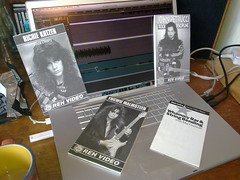 As promised, when the 1st of the Steve Lawson/Mike Outram tracks reached 500 plays, we uploaded another one. It’s a really long one that goes through 3 or 4 very different sections, though that evolve on into the next in a lovely fluid way. In order to explain a little of what’s actually going on (it’s a pretty big noise for just a bassist and a guitarist to make live!) I’ve annotated the track, as you can see below. Continue reading “Annotating Tracks With Soundcloud”
As promised, when the 1st of the Steve Lawson/Mike Outram tracks reached 500 plays, we uploaded another one. It’s a really long one that goes through 3 or 4 very different sections, though that evolve on into the next in a lovely fluid way. In order to explain a little of what’s actually going on (it’s a pretty big noise for just a bassist and a guitarist to make live!) I’ve annotated the track, as you can see below. Continue reading “Annotating Tracks With Soundcloud”
Web Stats for musicians: Lies, Damned Lies and Google Analytics.
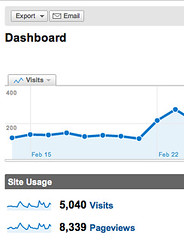 So, you’ve taken the advice and started blogging. You’ve put your music up on Bandcamp for ‘pay what you want’ download. You’re chatting to your audience, friends and fellow musicians on Twitter and Facebook. Now you want to be able to measure how much impact all this stuff is having, right?
So, you’ve taken the advice and started blogging. You’ve put your music up on Bandcamp for ‘pay what you want’ download. You’re chatting to your audience, friends and fellow musicians on Twitter and Facebook. Now you want to be able to measure how much impact all this stuff is having, right?
Almost all web-hosting comes with some kind of statistics option for tracking how many people are visiting your website, and what they are doing. The most widely used 3rd party option is Google Analytics, which is available to be added to any website (and particularly easily integrates with publishing packages like WordPress and Moveable Type). Continue reading “Web Stats for musicians: Lies, Damned Lies and Google Analytics.”
Curating a Live Event: Never Settle For Less Than Greatness.
 Following up my last post about recommending awesome things, I want to tie the same ideas into putting on events. The trigger for this was the Antwerp Looping Festival which I played last Saturday night.
Following up my last post about recommending awesome things, I want to tie the same ideas into putting on events. The trigger for this was the Antwerp Looping Festival which I played last Saturday night.
A bit of background – the ‘festival’ was one night, 6 artists, in a gorgeous little theatre venue in Antwerp, organised by one of the performers – Sjaak Overgaauw.
The whole idea of a ‘looping festival’ or any other non-genre- or personality-specific festival is fraught with possible marketing pitfalls – if there’s no inherent style of music, or artistic/culturally-thematic link, how on earth do you make it work? What are people coming to, and why? Who are you going to market it to? Continue reading “Curating a Live Event: Never Settle For Less Than Greatness.”
More on Favours And Recommendations
 I’ve mentioned a few times on here that I’m not a big fan of reciprocation-dependent deals between musicians to plug each other’s stuff. Let me expand on that a bit.
I’ve mentioned a few times on here that I’m not a big fan of reciprocation-dependent deals between musicians to plug each other’s stuff. Let me expand on that a bit.
One of the most valuable currencies that anyone (music-person or otherwise) has online is their recommendation. Loads of people have written about this (Chris Brogan wrote a book about it called ‘Trust Agents’ …that I haven’t read.), but basically, if you talk about things you believe in, the people who hear those recommendations are going to find things that are awesome to someone. They won’t necessarily agree, but that’s not the point – you’re not pandering to an audience, you’re getting excited about greatness.
So, how does this work in a world where we’re all meant to help each other out? I mean, I also talk a lot about the way that collectives and coalitions can work in favour of musicians…
The workable reality is as always somewhere in the middle – there’s nothing wrong with feeling grateful and acting on that. To take your impetus to finally get round to blogging about a band from the fact that their drummer just tweeted about how awesome you are is perfectly natural and fine. Contrast that with the ‘if you put us in your top friends on MySpace, we’ll do the same…’ mentality. ‘Do this for me then I’ll do this for you’ is a recipe for the survival of the pushiest, not the awesomest. And it also overstates the value of a recommendation, link or ‘top friend’ in and of itself. The existential value of such a thing is negligible. It just being there means next to nothing. It’s only real value is in the energy that’s behind it. And that energy is cumulative, but can also be diminished by dilution.
If I get an endless stream of links from someone about lame-assed music, it doesn’t suddenly make me like rubbish music. It makes me think that either
- their taste and mine really don’t match, or
- they’re not to be trusted cos they link to any old shit that may lead to them getting a link back.
That’s the death of value.
Same goes for only ever linking to stuff in which you have a vested interest – if the only bands you ever plug are people you’re working with, it looks like you just want more people at your shows. It stands to reason that you’re going to want to work with musicians you think are awesome, so this isn’t some unworkable call to never draw any benefit from the stuff you put out there – of course not, almost all of us want to have more listeners, more gigs, more people to play to. (Or at least, have more people wanting to see us so we can pick and choose the gigs we do!) It’s all about finding the balance, and building a social DNA chain that points to you being not just a producer of great music, but a curator of great everything.
The principle is one of ‘value-added’: how many extra ways can you make your story – and the media, events and supporting cast that surround it – compelling to the people who are discovering it? You can be exciting, funny, sexy, distracting, educational, passionate, inspiring, consoling, wise, dangerous, scary.. you can be a node-point for finding great things, a recommender of great books or films or food, a philosopher, theologian, comedian, curator, historian, essayist, guitar-ninja, recording advisor, producer, svengali…
When I hear musicians saying ‘I just want to make music, I don’t want to have to be a social networker or marketer’, I do have to wonder what they really want to fill their days with. The big question becomes, ‘yes, but what do you want to make music about??’ Great music – world-changing, awesome music – never exists in a vacuum. It’s always part of a story, and its inspiration is very often a big part of the value in it. Don’t try and tell me that the success of the Beatles wasn’t down to their personalities, stories, controversies and cultural experimentation/boundary-pushing as much as it was the notes on the record… Whether the music was the gateway to the story or vice versa is largely moot – they feed one another in a loop. Story leads to music about the story when leads back to the music.
And the music you talk about is part of that story ‘check out my friend, cos he wants you to check out me’ is a really really shitty story. ‘Check out this amazing film, it changed my life’ is a far more compelling story, and one that will make me want to hear your music. Srsly.
In Pt II, I’ll talk about this with live gigs.
For now though, have a listen to Premonition Factory’s album – pure, gorgeous ambient goodness. Got this at the weekend in Antwerp. Fabulous stuff:
